from Success Magazine
A Blue-label Saint
by Ellis Parker Butler
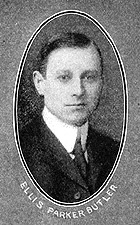
"Dugan!" called Mr. Fogarty.
Dugan was standing on the top step of a wabbly stepladder, nailing the eighth letter of the motto, "Peace On Earth, Good Will To Men," on the wall above the stage in Prendergast Hall. His mouth was full of wire nails, and the gilt cardboard letters, A, R, T, and H, were clasped between his shaking knees. He looked down and frowned.
"Phwat?" he asked.
"Come on down," said Fogarty. "Oi want a word wid ye."
Dugan was the janitor of Prendergast Hall and the boss of it, but Fogarty was the head of the Janitors' Union, so Dugan came down.
"Phwat is ut?" he asked. He still held his hammer in his hand, ready to go on with his job.
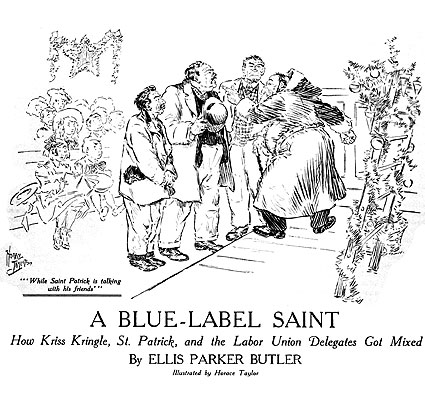
"Ye're called out," said Fogarty. "Prendergast is havin' his kitchen whitewashed by th' man, Diggs, who is outside th' Whitewashers' an' Kalsominers' Union, an' th' Confederation has boycotted Prendergast. The Whitewashers' an' Kalsominers' Union requists every union man not t' work for Prendergast, an' in me capacity of Prisidint of th' Janitors' Union Oi order ye t' come out on strike. Will ye come?"
Dugan emptied the nails from his mouth and laid the hammer on a step of the ladder.
"Shure!" he said; "shure will Oi come."
He looked up at the uncompleted motto.
"But 'tis too bad Diggs got th' job just whin th' ladies of th' mission is in need of th' help of me!"
Miss Willis, who had been filling red mosquito netting stockings with candy, and Miss Jones, who had been tying strings around pink popcorn balls, saw that something was wrong and came over to where Dugan was standing.
"There'll be no Christmas fer yez, this year, ma'm," said Dugan, "and don't blame me, -- 't is a fellow done ut. Oi 'm called out on strike, ma'm, an' th' hall will be shut up, fer there's no wan t' janitor ut fer yez."
Miss Jones and Miss Willis looked at each other aghast. The North Star Mission Sunday School had been meeting in Prendergast Hall for years. There was no other auditorium in the South End available, and all the little mission scholars had been invited to the Christmas Eve exercises. There was to be a program and singing, and then the beautiful Christmas ladder, evergreen-bedecked, and covered with candy and popcorn and presents, and Mr. Henley as Santa Claus to climb the ladder and make the joyous distribution.
Dugan rubbed his red hair sympathetically and frowned, while the ladies talked rapidly together.
"Go awn down," said Dugan to Fogarty; "Oi will pick up me tools an' be wid ye."
Fogarty went out.
"If only Mr. Henley was here!" said Miss Jones. "A man knows so much better what to do."
Mr. Henley was the mission's only man. He came because Miss Willis came.
"We might get him to janitor for us that one evening," suggested Miss Willis.
"And who would be our Santa Claus?" asked Miss Jones.
Miss Willis looked at Dugan. With his red whiskers he did not look much like the white-bearded Christmas saint, but neither did Mr. Henley. There was a mask and a wig to fix all that.
"Not me!" said Dugan, quickly, when he saw Miss Willis glance his way. "Oi'm on strike!"
"But, Mr. Dugan --" began Miss Willis. She was quite ready to cry, they had worked so hard and the thing had promised so well. The ladder was a great improvement over the ordinary Christmas tree. The year before they had had a bell, made of hoops covered with greens, and the children had enjoyed it so!
"But, Mr. Dugan --" she pleaded from her heart. "Of course," said Miss Jones," we wouldn't ask you to do any janitor work. We wouldn't expect that, if you are striking. But you have the right to do other work, haven't you?"
"Not fer Prendergast," said Dugan.
"But it isn't for Prendergast," Miss Jones insisted; "it is for us."
"Oi'm a union man," said Dugan, slowly, "an' no scab. An' 't is right Oi sh'u'd work, whin on strike, if ut's work for a union man, an' not a scab job. But is th' mission a 'fair' shop, Oi dunno!"
Miss Jones's eyes sparkled. "It belongs to a union," she said.
"Oi dunno that wan," said Dugan.
"It's the Sunday School Union," said Miss Jones.
"An' kin Oi git a card in th' union, Oi dunno," said Dugan, doubtfully. "Widout a card Oi c'u'd not tek th' job. Thim is th' rules."
"We can get you a card," said Miss Jones; "we can get you a regular Sunday school card and enroll your name on the membership list of the mission, which is a branch of the International Union."
Dugan rubbed his chin.
"Oi dunno, is there, mebby, a Santa Claus Union?" he said, slowly. "They be so hang manny unions, these days. Phwat is this Santa Claus loike, now? Phwat is th' job of him?"
"Well," said Miss Jones, cheerfully, "all you have to do is to wear the suit and go up the ladder and take down the toys and candy and popcorn and hand them to the children when they come to the foot of the ladder. I know you will like that, Mr. Dugan, the children are so happy when they get their presents. They all love Santa Claus. You know he was the good old children's patron saint, in Holland. --"
"Oh, ho!" said Dugan -- "Dutch, is he? An' Oi'm t' be a Dutch-Irishman, am Oi? No, ma'm! Git some other Santa Claus. Niver was a Dugan a Dutchman, Miss Jones, an' niver will a Dugan be wan. Dom th' Dutch! Look how they be gittin' all th' janitor jobs, these days! Oi'll be no Dutch saint fer yez. Sooner w'u'd Oi see a Dutchman be Saint Paterick!"
"All right!" said Miss Jones, promptly; "then you can be Saint Patrick. It doesn't matter the least. We would quite as willingly have you be Saint Patrick."
"That is more loike!" said Dugan, with satisfaction. "Saint Paterick Oi will be, an' gladly, ma'm, fer he was the grandest saint of all of thim, an' niver a Dutch saint was knee high t' him. Saint Paterick Oi will be."
"Of course," said Miss Jones, "we will pay you the regular Sunday School Union wages for Saint Patrick. They are a little less than for Santa Claus."
Her eyes twinkled as she said it, but Dugan received it soberly.
"Let be!" he said; "'tis little enough did they pay double wages for a man t' pretend t' be a Dutch saint. 'T is a wonder annywan but a scab will tek th' job."
Miss Willis took from a basket the costume that had served long and well as a garb for Santa Claus. Dugan looked at it.
"Phwat's thim?" he asked.
"You wear these when you are San -- Saint Patrick," explained Miss Willis.
"Red!" said Dugan; "thim is no Saint Paterick uniform. Thim is th' duds of a dang Britisher. 'T was th' good ould green Saint Pat was afther wearin'! Hev ye no green wan?"
"No," said Miss Willis, hesitatingly. She looked at Miss Jones questioningly.
"We can make a green one," said Miss Jones, promptly. "If you will help us with the decorations of the hall we can make a green suit tomorrow morning, and then your wages will begin now."
Dugan thought a moment.
"Oi hate t' do ut," he said; "but 't will not matter, th' afthernoon."
He stooped down and picked up the loose red trousers and began to draw them on.
"What --" began Miss Willis, but Miss Jones put her finger on her lips. Dugan slipped into the stuffed red coat and buttoned it. He looked at the long white wig and the mask with its white beard, and hesitated.
"I don't think you need wear the face, this afternoon," suggested Miss Jones; "you can see better without it."
"Where did Oi put th' hammer?" asked Dugan, "an' which wan af these letters goes up nixt?"
Fogarty came in as Dugan reached the top of the ladder.
"Tim," said Fogarty, and then he caught sight of Dugan's red rim of whiskers above the plumply padded red stomach of the Irish Santa Claus.
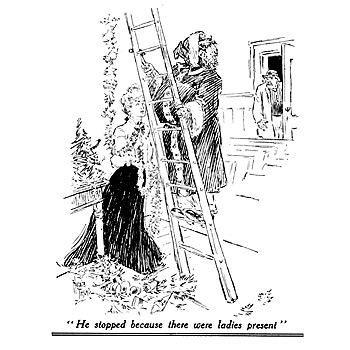
"Phwat th' --" he began, and as suddenly stopped because there were ladies present.
"Go awn down," said Dugan, "an' tell Prendergast Oi'm sthriken', so he'll know ut. Oi've taken a timporary job, Fogarty, wid th' Union of Sunday School Missions, as Saint Paterick, an' this is me uniform." Fogarty grinned.
"Yer a moighty red Saint Paterick, thin, Dugan," he said.
"Red?" said Dugan; "red, is ut? Shure, Oi know now phwy ye quit railroadin', Fogarty. Red? 'T is green, Fogarty, -- grass green, ye see, but 't is color blind ye be."
The next evening Dugan was on hand early, and he put on the green suit with great pride. He could hardly sit still in the little dressing room off the stage while the earlier portion of the exercises was going on, he was so anxious to appear before the audience. Mr. Henley, little and bald and spectacled, was everywhere. At one moment he was poking the fire in the barrel stove, the next he was finding a seat for a latecomer, and the next, opening or lowering a window.
There were Christmas carols by the whole mission, and a little talk by Miss Jones, and more carols by the mission collectively, individually, and in groups, but all the while the children restlessly awaited the lighting of the candles on the tall ladder, which was bright with its swathing of greens and popcorn strings and glittering glass ornaments. It was exciting to hear the jingle of sleigh bells that came from the dressing room as Saint Patrick Dugan crossed his legs a different way, and once, when Dugan sneezed, there was such a jingling that Sadie Moriarty stopped right in the middle of the solo she was singing and had to begin at the beginning again.
"Now, children," said Miss Jones, when the last carol had been sung, "we are going to have the good Santa Claus --"
"Santa nawthin'," said a rich voice from the dressing room, -- "'Tis Saint Paterick."
Miss Jones looked anxiously in the direction of the voice.
"Children," she began again, "we who have charge of the mission have tried to give you this Christmas something a little different from the usual program. You all know about the Christmas tree and what it signifies, but this year we have a Christmas ladder. Last year we had a bell, which signified, 'Ring out the glad tidings.' Our ladder and the motto above it mean that we should try to climb toward --" but that part of the little speech was dead words to the eager children. It passed over their heads until she came to the real business part of it.
"And we have another surprise for you," she said. "We will have no Santa Claus this year." She waited a moment to let the awful significance of this sink in, and then brought joy to the blank faces again.
"Instead," she said, gaily, "good Saint Patrick has come to take the presents from the ladder. As I call each little boy's and girl's name the little boy or girl whose name is called will come up and receive the present from the hands of Saint Patrick."
She turned, and Mr. Henley began briskly lighting the candles on the ladder, while the school sang "Onward, Christian Soldiers." The ladder sparkled with lights while they sang, "Hark, the Herald Angels Sing!" and then Mr. Henley briskly extinguished the candles, and the good gray and plump Saint Patrick stalked forth to carry out his part of the program.
"Gee!" cried an excited voice, "look at de green Santa Claus!" while Sadie Moriarty confided to her seatmate, "It ain't no real Saint Patrick; it's only Mister Dugan rigged up."
Dugan rattled his bells and bowed low to the audience. On one arm he carried a basket, into which to put the gathered fruits of the ladder as he plucked them. There was a lively silence, slit by whispers and rustlings of garments, and Dugan turned and put his foot on the ladder.
At that moment three men arose in the rear of the hall, and one called authoritatively: --
"Dugan!"
Dugan stopped and looked around.
"Tst!" said the man, beckoning with his hand.
Dugan hesitated, started to climb the ladder, and thought better of it.
"Phwat is ut?" he asked in a loud whisper. "An', phwativer ut is, address me as Saint Paterick."
The men beckoned earnestly, but Dugan stood still. The whole mission was craning its necks to see who was holding communication with Saint Patrick, and Miss Jones and Miss Willis were standing amazed. Mr. Henley tripped briskly down the aisle to the three men and spoke with them quickly. Then he led them up the aisle to Dugan.
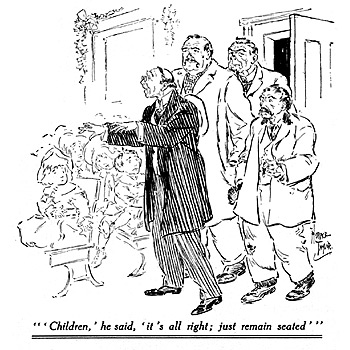
"Children," he said, "it is all right; just remain seated."
Two of the men were very large men, and one was small. Their countenances showed embarrassment, but firmness.
"I know what them is," said Sadie Moriarty; "them is the three wise men of the East. They had 'em once at the 'Piscopal Sunday School, up town."
Dugan came a few steps to meet them.
"Me name is Hogan," said one of the big men, "an' Oi mek you acquainted with Misther Larry Flannery an' Misther Moses Levinsky. You can't go up that ladder, Misther Dugan."
"Dang!" said Dugan, "an' phwy not? Is it a non-union ladder?"
"Oi dunno," said Mr. Hogan, "ut may be. Ut is Delancy's ladder, an' he is a union-shop carpenter, so belike th' ladder is good enough, but 't is not fer you t' be climbin' ut."
"Children," said Miss Jones, nervously, "we will sing 'Onward, Christian Soldiers!' again, while Mr. -- while Saint Patrick is talking with his friends."
The gray-bearded saint laid his basket on the floor and peeled off his gloves.
"Who ye be, Misther Hogan," he said, roughly, "Oi don't know, an' Oi don't care, but no wan says Tim Dugan can not go up anny ladder that's union made. Go awn out, an' whin Oi git troo wid me exercises Oi'll come outside and bat th' whole face off af ye. No man says 'Dugan, do this!' or 'Dugan, don't do ut!' t' Dugan."
"Second verse," said Miss Jones; "now, all together!"
"Oi'll tell ye who we be," said Mr. Hogan, angrily, "an' mebby 't will shut th' abusive mouth of ye. We be a delegation of th' Hod Carriers' Local Union, Nummer One. That's who we be, Misther Tim Dugan, an' come t' tell ye yer doin' a dirthy scab trick, takin' a job out of th' mouths of union men."
"Ho!" jeered Dugan, -- "union men! D'ye think Oi was born yestiddy at ten o'clock? Union men! W'u'd ye be tellin' me there's a Saint Paterick Union?"
"No," said Mr. Hogan; "there be not, but did ye iver hear tell of th' Hod Carriers' Union, Misther Timothy Smart-aleck Dugan? Did ye?"
"Oi hev!" said Dugan, shortly.
"Ye hev!" said Mr. Hogan. "Good fer ye, Misther Dugan! Well, sor, 't is t' warn ye 't is a hod-carriers' job ye'v got, an' t' warn ye t' git off th' job immejiate or hev yer union card took away by th' Janitors' Union fer bein' a scab, Misther Dugan." Dugan tried to rub his brow, and his hand met the smooth surface of the false-face.
"Third verse!" said Miss Jones, hopefully.
"D' ye see anny hod on me, Misther Hogan?" asked Dugan.
"'T is all th' same, hod or basket," said Mr. Hogan, "by th' rules of th' Hod Carriers' Union. Read th' rules t' Misther Dugan, Misther Levinsky."
Mr. Levinsky took the yellow-back pamphlet from his pocket.
"'Rule Te-venty-von,'" he read, -- "'A hod-carrier shall pe any von who goes up ant town any latter or stairvay or odder t'ings, carrying bricks or mordar or odder t'ings in any hod or box or basket or any odder t'ings.'"
"Well," said Mr. Hogan, "is ut a ladder, Misther Dugan, and is ut a basket? Phwat? And is ut other things ye mane t' attimpt t' carry down th' ladder in th' basket?"
"T 'is no Saint Paterick job, then, that Santa Claus has," said Dugan, "but a hod-carriers' job!"
"'Tis so!" said Mr. Flannery and Mr. Hogan.
"But, if 'tis so," said Dugan, "phwat will th' kids do, an' th' poor things wid their mouths waterin' fer th' prisints an' as dry as a bone singin' thimsilves hoarse?"
"'Tis a union man's job," said Mr. Hogan, coldly.
"Thin divil a bit will Oi Saint Paterick ut for thim, though they be all th' kids in Ameriky," said Dugan. "'Tis a good union man Oi am, Misther Hogan, an' intindid no harm. Excuse me, sor, fer speakin' hard words t' ye. Oi beg yer pardon."
"Let be!" said Mr. Hogan, generously.
"Repeat first verse!" said Miss Jones, rather doubtfully.
"But Oi feel sorry fer th' kids," said Dugan, "an' thim so set on gettin' their prisints from th' hands of Saint Paterick."
"'Tis all right!" Mr. Hogan assured him; "we kem t' take th' job oursilves, Dugan. Wan of us will be Saint Paterick fer th' kids, an' 't will be betther fer thim t' git their prisints from a Union Saint Paterick than from a scab."
"Shure!" agreed Dugan, "come intil th' dressin' room an' put awn th' duds."
They reassured Mr. Henley, and Mr. Henley reassured Miss Jones, and Miss Jones reassured the audience and had it sing the second verse again.
In the dressing room Mr. Dugan shed the coat and Mr. Hogan tried to put it on. He could not so much as get his arms into it. Mr. Flannery, being larger than Mr. Hogan, did not attempt to wear it. They turned to Mr. Levinsky.
"Misther Levinsky," said Dugan, "get on th' duds, 'T is your job, an' good luck t' ye. But if iver anny wan had tould me Oi w'u'd live t' see th' day whin a Levinsky w'u'd be Saint Paterick for a Christmas Sunday school I'd have soaked him a good wan in th' eye. Mebby th' leddys w'u'd be afther tellin' th' kids Saint Paterick had a call t' meet Santa Claus at th' club, an' passed on th' job t' Moses."
Levinsky did not fit the suit well. By turning the trousers up a foot at the bottom he was able to wear them, but the grace of his movements was destroyed by the rotund cotton-batting stomach of Santa Claus, which hung before his knees. He turned up the cuffs of the coat sleeves to let his hands have breath, but when he walked the artificial stomach knocked forward spasmodically with each step as his knees struck it. The mask and wig extinguished his head. Even Sadie Moriarty giggled when he walked into view, and as he climbed the ladder, carefully lifting the stomach out of his way before each step upward, Miss Jones had to put her eyes deep into a hymn book to hide her feelings.
Dugan, relieved of his duties, took his seat in the front row, with Hogan and Flannery on either side of him.
"'Tis a good rule," he said to Hogan, "that rule twinty-wan of th' Hod Carriers, -- 't is so widespread an' generous-like. Annything ye go up is a ladder, an' annything ye go down is a ladder, an' annything that will hold annything is a hod, an annything annything will hold while ye go up or down annything is a brick. Well, annyhow, Oi'm glad ye did not let me break th' rule. Oi'm a good union man, Christmas or anny other day. An' 't is plisint t' sit here an' see th' kids come grinnin' up fer their prisints, an' just as pleased with a Levinsky Moses as wid an Irish Saint Paterick or a Dutch Santa Claus. The unions is all roight, I can tell ye, Hogan."
"Mr. Dugan!" called Miss Jones, -- "Mr. Timothy Dugan!"
"An' phwat is that, now?" said Dugan, surprised.
"'T is a prisint fer ye," said Hogan; "go awn up an' git ut."
"A prisint fer me?" Dugan asked, "look at that, now! Ain't they th' daycent leddys, though, t' think of Tim Dugan?"
He walked the few feet to where Levinsky stood holding out a square parcel, and took it.
"Thank ye, Saint Paterick Moses," he said, and returned to his seat by Hogan.
"Open ut," said Hogan.
Dugan, grinning, opened the package. He half expected some hoax. It was a full box of fifty cigars.
"Dang!" said he, and tears of pleasure filled his eyes. "Ain't they th' daycent leddys?"
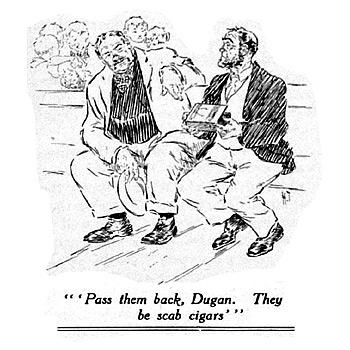
Hogan leaned over and took the box. He turned it over and handed it back.
"Pass thim back, Dugan," he commanded; "they hev no blue label. They be scab cigars, an' ye kin not tek thim. 'T would be ag'inst rule twinty-eight of th' union, an' unfair t' th' Cigar Makers' Union, t' smoke scab cigars. And, annyhow," he added, "they be Christmas cigars."
"Hang me if Oi don't turn scab, thin!" growled, Dugan, grimly, "before Oi'll pass wan of thim back to sich daycent leddys, bad suz t' rule twinty-eight, -- w'ich is hereby suspindid!"